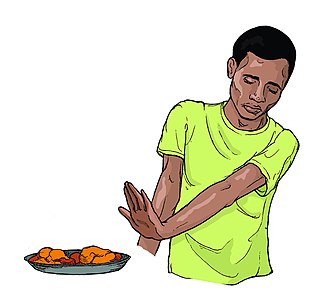
Anorexia is a medical term for a loss of appetite. While the term outside of the scientific literature is often used interchangeably with anorexia nervosa, many possible causes exist for a loss of appetite, some of which may be harmless, while others indicate a serious clinical condition or pose a significant risk.
Promotion of anorexia is the promotion of behaviors related to the eating disorder anorexia nervosa. It is often referred to simply as pro-ana or ana. The lesser-used term pro-mia refers likewise to bulimia nervosa and is sometimes used interchangeably with pro-ana. Pro-ana groups differ widely in their stances. Most claim that they exist mainly as a non-judgmental environment for anorexics; a place to turn to, to discuss their illness, and to support those who choose to enter recovery. Others deny anorexia nervosa is a mental illness and claim instead that it is a lifestyle choice that should be respected by doctors and family.
Sexual anorexia is a term coined in 1975 by psychologist Nathan Hare to describe a fear of or deep aversion to sexual activity. It is considered a loss of "appetite" for sexual contact, and may result in a fear of intimacy or an aversion to any type of sexual interaction. The term largely exists in a colloquial sense and is not presently classified as a disorder in the Diagnostic Statistical Manual.
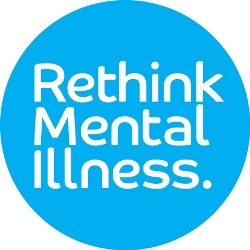
Rethink Mental Illness improves the lives of people severely affected by mental illness through their networks of local groups and services, information and campaigns. Their goal is to make sure everyone severely affected by mental illness has a good quality of life .
NHS 24 is Scotland's national telehealth and telecare organisation. This special health board runs a telephone advice and triage service that covers the out-of-hours period. The telephone service allows people who feel unwell or those caring for them to obtain health advice and information if it is not convenient or possible to wait until they can visit their general practitioner when the practice is next open. The advice line is not intended as a substitute for obtaining an emergency ambulance service via 999. The telehealth services provided by NHS Scotland fulfil some similar functions to NHS Direct Wales and the NHS 111 scheme in England.

The National Eating Disorders Association (NEDA) is an American non-profit organization devoted to preventing eating disorders, providing treatment referrals, and increasing the education and understanding of eating disorders, weight, and body image.
Wannarexia, or anorexic yearning, is a label applied to someone who claims to have anorexia nervosa, or wishes they did, but does not. These individuals are also called wannarexic, “wanna-be ana” or "anorexic wannabe". The neologism wannarexia is a portmanteau of the latter two terms. It may be used as a pejorative term.
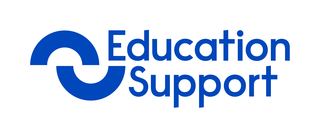
Education Support is a UK charity "dedicated to improving the mental health and wellbeing of the education workforce".
The National Association of Anorexia Nervosa and Associated Disorders (ANAD) is the oldest organization aimed at fighting eating disorders in the United States. ANAD assists people struggling with eating disorders such as anorexia nervosa and bulimia nervosa and also provides resources for families, schools and the eating disorder community. Headquartered in Chicago, Illinois, ANAD is a non-profit organization working in the areas of support, awareness, advocacy, referral, education, and prevention.
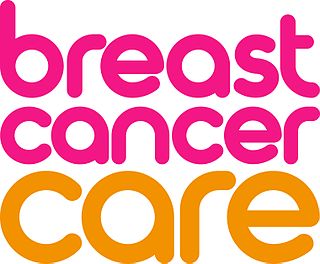
Breast Cancer Care is the only specialist UK-wide charity in the UK providing care, support and information to anyone affected by breast cancer. The charity's headquarters are in London, with additional offices in Sheffield, Cardiff, and Glasgow. It is regularly quoted by media looking for the perspective of patients on breast cancer.

Anorexia nervosa (AN), often referred to simply as anorexia, is an eating disorder characterized by low weight, food restriction, body image disturbance, fear of gaining weight, and an overpowering desire to be thin.
Sam Thomas is a campaigner for men living with eating disorders, mental health & alcohol addiction. In 2008 he founded Men Get Eating Disorders Too (MGEDT) which in December 2010 became a registered charity in the UK.
Ellern Mede is a specialist private provider of eating disorder services in England. It runs two hospitals in North London and one in Rotherham. The hospital in Warwick Road, Barnet opened in 2017. The service takes referrals from Child and Adolescent Mental Health Services for children with anorexia.

Janet Treasure, OBE PhD FRCP FRCPsych, is a British psychiatrist, who specialises in research and treatment of eating disorders.

Neil Greenberg is an academic psychiatrist, who is a specialist in the understanding and management of psychological trauma, occupational mental ill-health and post traumatic stress disorder. Greenberg works with King's College London and served as the President of the UK Psychological Trauma Society from 2014 to 2017. He also runs the psychological health consultancy March on Stress. During the 2020 COVID pandemic, Greenberg was part of the NHS England and Improvement Wellbeing Team and contributed to the national response to protect the mental health of NHS workers.

Dr Allan Johnston MBBS, MRCPsych, Cert.Med.Ed(IU) is a consultant psychiatrist with the National Health Service in the United Kingdom, working at Derbyshire Healthcare NHS Foundation Trust and a world leading Sports Psychiatrist at Spire Leeds Hospital working with professional athletes, dance artists, Premiership and Football League managers and coaches.
Mental health in the Republic of Ireland is the subject of state and community sector intervention in Ireland. The Irish state devolves responsibility for mental health to the Department of Health. Community groups and charities also provide support in the prevention and management of mental illness as well as suicide prevention.
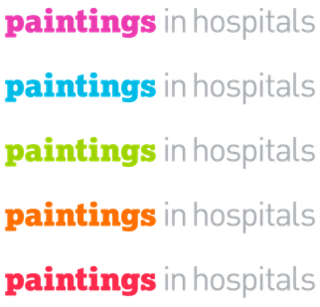
Paintings in Hospitals is an arts in health charity in the United Kingdom. Founded in 1959, the charity's services include the provision of artwork loans, art projects and art workshops to health and social care organisations. The charity's activities are based on clinical evidence demonstrating health and wellbeing benefits of the arts to patients and care staff.

Kate Tchanturia is a British psychologist who is a professor of psychology in eating disorders at the Institute of Psychiatry, Psychology and Neuroscience, King’s College London. She is also Consultant Psychologist at the South London and Maudsley NHS Foundation Trust for the National Eating Disorder Service. Her main research interests include cultural differences in illness presentations, cognitive profiles in eating disorders, and experimental work in emotion processing and translational research from experimental findings to real clinical practice. Tchanturia has a particular interest in women’s mental health and has pioneered the PEACE pathway for autism and eating disorder comorbidity.

The Lothian Gay and Lesbian Switchboard (LGLS) opened on 2 March 1974, and was the United Kingdom's first gay helpline and Scotland's first gay charity. Initially called the Edinburgh Befriending Service, it was established one day prior to the London Lesbian and Gay Switchboard, known as Switchboard (UK).













